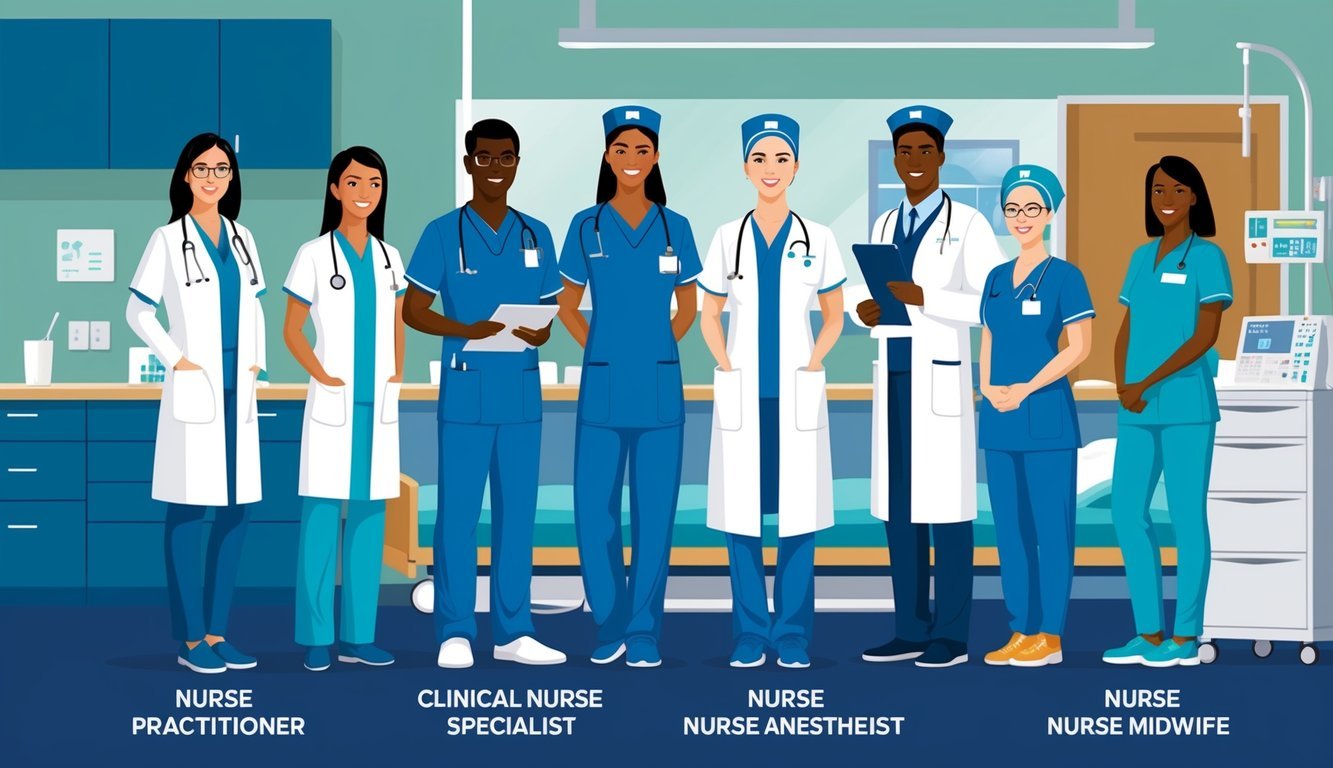Advanced Practice Registered Nurse (APRN) programs are vital for those looking to enhance their nursing careers.
These programs prepare you for specialized roles, allowing you to provide high-level care and make a significant impact on patient outcomes.
As healthcare evolves, the demand for skilled APRNs is growing, making this an ideal time to explore your options.
With various specializations available, you can tailor your education to fit your career goals.
Each pathway offers unique challenges and rewards, ensuring that you find a niche that excites you.
Whether you’re interested in becoming a nurse practitioner, clinical nurse specialist, or a nurse anesthetist, there’s a program that suits your aspirations.
Selecting the right APRN program is crucial for your success.
By considering factors such as curriculum, accreditation, and faculty expertise, you can find a program that aligns with your career objectives.
The investment in your education now will open doors to numerous opportunities in the future.
Key Takeaways
- APRN programs enable you to specialize and advance your nursing career.
- Choosing the right program involves evaluating factors like curriculum and accreditation.
- The growing demand for APRNs offers excellent career prospects and advancements.
Understanding APRN Programs

Advanced Practice Registered Nurse (APRN) programs prepare you for specialized roles in nursing.
These programs focus on advanced skills and knowledge, allowing you to provide high-quality patient care.
Role and Scope of Practice for APRNs
As an APRN, your role includes providing comprehensive care to patients in various specialties.
This could be as a Nurse Practitioner (NP), Certified Nurse Midwife (CNM), Clinical Nurse Specialist (CNS), or Certified Registered Nurse Anesthetist (CRNA).
Your scope of practice may vary by state, depending on local regulations.
Generally, you can perform assessments, make diagnoses, and initiate treatment plans.
NPs often focus on specific populations, such as family or pediatric care, tailoring your expertise to meet community health needs.
Your training includes significant clinical hours, providing real-world experience.
This hands-on learning helps bridge theory and practice, ensuring you can handle diverse patient scenarios effectively.
Advanced Practice Registered Nurse (APRN) Essentials
Enrollment in an APRN program typically requires a Bachelor of Science in Nursing (BSN).
You will then pursue a master’s or doctoral degree, focusing on advanced clinical practice.
Key components of your education will include:
- Coursework on pharmacology and pathophysiology
- Clinical rotations in various settings
- Training in patient assessment and diagnostic skills
The APRN Consensus Model outlines essential criteria for your education, ensuring consistency across states.
This model emphasizes core competencies, allowing for a clear understanding of the roles within advanced practice.
Complete your training, and you’ll be ready to make impactful decisions in healthcare.
For more information on APRN programs, you can visit Advanced Practice Registered Nurse (APRN).
Types of APRN Specializations

There are several key types of Advanced Practice Registered Nurse (APRN) specializations that you can pursue.
Each focus area allows you to provide targeted care to specific populations, enhancing your skills and expertise.
Family Nurse Practitioner (FNP)
As a Family Nurse Practitioner, you play a crucial role in providing comprehensive care to individuals across their lifespan.
FNPs are trained to treat patients of all ages, from newborns to the elderly.
Your responsibilities may include performing physical exams, diagnosing and treating illnesses, and managing chronic conditions.
FNPs often work in a variety of settings, such as private practices, clinics, and community health centers.
You will also promote preventative care and health education, helping patients make informed decisions about their health.
Nurse practitioner programs for FNPs typically focus on both clinical and family health concepts to prepare you for this role.
For more details on FNP programs, visit Nurse.com.
Pediatric Nurse Practitioner
In the role of a Pediatric Nurse Practitioner, you specialize in caring for infants, children, and adolescents.
Your training includes assessing growth and development, diagnosing common illnesses, and managing pediatric chronic conditions.
You may work in pediatric clinics, hospitals, or schools, providing health care services tailored to younger patients.
In addition to clinical skills, you will also focus on educating parents about nutrition, health maintenance, and disease prevention.
Programs for this specialization emphasize child development and family dynamics, crucial for effective care.
Psychiatric-Mental Health Nurse Practitioner
If you choose to become a Psychiatric-Mental Health Nurse Practitioner, you will focus on mental health care.
This specialization trains you to diagnose and manage mental health disorders such as depression, anxiety, and schizophrenia.
Your role may involve providing therapy, prescribing medications, and coordinating care for your patients.
You will call upon both clinical skills and therapeutic communication techniques to establish trust and rapport.
Many programs focused on this specialty offer both practical training and theoretical education on mental health issues.
For more information, explore resources like NurseJournal.org.
Adult-Gerontology Nurse Practitioner
As an Adult-Gerontology Nurse Practitioner, you focus on caring for adults, especially the elderly.
You have two distinct paths in this specialization: acute care and primary care.
Adult Gerontology Acute Care Nurse Practitioners typically work in hospital settings and manage complex conditions.
You are trained to provide immediate care and support for patients with serious health issues.
Adult Gerontology Primary Care Nurse Practitioners emphasize preventive care and long-term management of chronic diseases.
Both roles require a deep understanding of adult health issues and effective communication with patients and families.
For comprehensive details on this specialization, consider checking out NursingProcess.org.
These specialized areas allow you to make a significant impact in your patients’ lives by addressing their unique health needs.
Pathway to Becoming an APRN

Becoming an Advanced Practice Registered Nurse (APRN) involves several key steps, including academic qualifications, obtaining necessary licenses, and completing clinical training.
Each part of this pathway is essential for your future practice as an APRN.
Academic Requirements
To start your journey, you need to have a strong educational foundation.
You must first earn a Bachelor of Science in Nursing (BSN) degree, which prepares you for the responsibilities of nursing.
Once you have your BSN, you can pursue a Master’s of Science in Nursing (MSN) or a Doctor of Nursing Practice (DNP) degree.
Graduate programs vary in length, with an MSN typically taking about two years, while a DNP may require an additional one to two years.
If you hold a different bachelor’s degree, you may also explore accelerated nursing programs.
It’s crucial to choose an accredited program that meets the educational standards necessary to sit for national certification exams.
Licensure and Certifications
Once you complete your degree, you must obtain your RN license to practice.
This involves passing the National Council Licensure Examination for Registered Nurses (NCLEX-RN).
After becoming a licensed RN, you then pursue national certification in your chosen specialty.
There are several certifications available, such as Family Nurse Practitioner (FNP), Adult Gerontology Acute Care Nurse Practitioner (AGACNP), and Psychiatric Mental Health Nurse Practitioner (PMHNP).
Each certification requires you to pass specific certification exams.
Make sure to check that your program is accredited and that you fulfill all prerequisites for your chosen certification.
Clinical Training and Experience
Clinical training is a vital component of becoming an APRN.
You will need to complete a specified number of clinical hours, which vary by specialty.
For example, family nurse practitioners typically require 500 clinical hours.
These clinical experiences allow you to apply your knowledge in real-world settings, working under the supervision of experienced mentors.
Gaining diverse experiences in patient care will enhance your skills and prepare you for independent practice.
Clinical training also helps you build a professional network, which can be beneficial for future job opportunities.
APRN Education and Curriculum

In APRN programs, education and curriculum focus on comprehensive training and skills necessary for advanced practice nursing.
This includes various core components, an emphasis on evidence-based practice, and specialized clinical skills that prepare you for your role.
Curriculum Components
The curriculum for APRN programs includes essential coursework that covers foundational aspects of nursing practice.
Key subjects often include:
- Pathophysiology: Understanding disease processes is crucial for diagnosis and treatment.
- Advanced Pharmacology: This involves a deep dive into medications, their mechanisms, and implications for patient care.
- Health Assessment: Skills in assessing patient conditions are developed through both theoretical and practical learning.
Additionally, specialized topics such as population health and pediatrics are often included.
These areas ensure you are prepared for diverse patient populations and settings.
Programs might also incorporate interprofessional education, fostering collaboration with other healthcare disciplines.
Evidence-Based Practice in Nursing
In APRN programs, evidence-based practice (EBP) is a core principle that guides clinical decision-making.
EBP combines clinical expertise, patient values, and the best research evidence.
Courses encourage you to evaluate clinical guidelines and studies to inform your practice.
For example, a focus on epidemiology equips you with knowledge about health trends, while cases in population health help you address community needs.
Learning to apply EBP enhances your ability to provide effective patient care and improves health outcomes.
Specialized Clinical Skills
Clinical training in APRN programs is vital for developing specialized skills.
You will participate in hands-on experiences in various settings, gaining proficiency in essential procedures and assessments.
Skills are often tailored to your chosen population focus, whether it’s adult care, pediatrics, or geriatrics.
Training may include areas like:
- Advanced physical assessments
- Diagnostic techniques
- Patient communication strategies
Structured clinical placements provide opportunities to practice in real-world scenarios.
This direct experience is crucial for building confidence and competence as an advanced practice nurse, laying the groundwork for your professional success.
Selecting the Right APRN Program
Choosing an Advanced Practice Registered Nurse (APRN) program is crucial for your career.
The right program aligns with your goals and offers the educational framework you need.
Consider factors like program type, school reputation, and offerings to find the best fit for you.
Factors Affecting APRN Program Selection
Several factors influence your decision when selecting an APRN program.
First, evaluate the type of degree that matches your career objectives.
Common options include a Master of Science in Nursing (MSN) and Doctor of Nursing Practice (DNP) programs.
Next, check the admission requirements.
Some programs may accept candidates with a non-nursing bachelor’s degree, especially direct-entry nurse practitioner programs.
Look into the curriculum and ensure it covers your desired specialty, like the family NP track.
Finally, consider the program’s format.
Options range from fully online nurse practitioner programs to traditional classroom settings.
Assess the school’s clinical placement support and networking opportunities, as these can enhance your learning experience.
Top Nurse Practitioner Programs
When considering APRN programs, several institutions stand out for their high-quality education.
Here’s a table of notable programs:
| University | Program Focus | Tuition Information |
|---|---|---|
| Emory University | Family NP, Clinical Leadership | In-state: $11,030/year |
| Duke University | DNP, Nursing Education | In-state: $36,000/year |
| Ohio State University | MSN – Family NP | In-state: $14,187/year, Out-of-state: $41,775/year |
| Drexel University | Family NP, Adult Gerontology NP | $35,000/year |
| George Washington University | DNP, Women’s Health NP | In-state: $29,500/year |
| Seton Hall University | Family NP, Family and Child NP | In-state: $1,149/credit hour |
Research these programs further to determine which aligns with your needs.
Online Education Opportunities
Online education has become popular for APRN programs, making it easier for you to balance studies with work.
Many schools now offer online nurse practitioner programs, allowing for flexibility.
Programs vary in structure.
Some are fully online, while others use a hybrid model combining online and in-person classes.
Ensure the program you choose has strong clinical placements.
Schools like Drexel University and Ohio State University provide robust online options.
Look at the support services available, such as academic advising and virtual resources, which can enhance your learning experience.
Career Outlook and Advancements
The career outlook for advanced practice nurses, particularly nurse practitioners (NPs), continues to grow positively.
Factors such as increased demand for healthcare services due to an aging population and the emphasis on health promotion and disease prevention play significant roles in shaping this landscape.
Current Employment Trends
According to the Bureau of Labor Statistics, employment for nurse practitioners is projected to increase by 40% from 2023 to 2033.
This growth is much faster than the average for all occupations.
The rise in healthcare needs, particularly in primary care and preventive services, leads to more job openings in this field.
Nurse practitioners are increasingly recognized for their ability to prescribe medications and provide a wide range of services.
Many NPs work independently, especially in full-practice authority states.
This trend allows you to offer comprehensive care, thus enhancing your job prospects.
Organizations like the American Association of Nurse Practitioners highlight the increasing demand for NPs in various healthcare settings.
Long-Term Career Development
As a nurse practitioner, your career can advance in various ways.
Obtaining national certification enhances your qualifications and opens doors to specialized roles.
Programs that focus on areas like nursing leadership and advanced clinical practice can lead to higher positions with increased responsibility and pay.
Continual education and additional certifications can set you apart.
Engaging in medical research or policy-making roles also offers pathways for growth.
Exploring top nurse practitioner programs can further your knowledge and skills.
The NP journey is more than just certification; it includes ongoing professional development to adapt to the evolving healthcare environment.
Frequently Asked Questions

In this section, you will find answers to essential questions about Advanced Practice Registered Nurse (APRN) programs.
These FAQs cover the steps to become an APRN, options for online courses, program duration, specializations, and how APRNs differ from Nurse Practitioners.
What are the steps to become an Advanced Practice Registered Nurse (APRN)?
To become an APRN, you need to follow several steps.
First, complete a Bachelor of Science in Nursing (BSN) or an equivalent degree.
Next, obtain a registered nurse (RN) license through your state board.
After that, enroll in a graduate program that offers a Master’s or Doctoral degree in nursing.
Finally, pass a national certification exam to practice as an APRN.
Which institutions offer the best APRN programs?
Many universities offer highly regarded APRN programs.
Some of the top institutions include:
| Institution Name | Program Overview |
|---|---|
| Johns Hopkins University | Offers a variety of specializations with flexible options. |
| University of Pennsylvania | Known for its research and diverse clinical experiences. |
| Duke University | Offers a robust curriculum with strong clinical training. |
| University of California, San Francisco | Focuses on innovative care and interdisciplinary approaches. |
You can find more details on specific programs by visiting their official websites.
Can I complete an APRN program through online courses?
Yes, many APRN programs offer online courses.
This flexibility can help you balance work and studies.
Be sure to check if the program is accredited and meets your state’s licensure requirements.
Programs often combine online learning with in-person clinical placements.
What is the typical duration of APRN education and training?
The duration of APRN education varies.
Generally, Master’s programs take 2-3 years to complete, while Doctoral programs can take 3-4 years.
This timeline includes coursework as well as clinical training.
How does an Advanced Practice Nurse differ from a Nurse Practitioner?
The terms are often used interchangeably, but there are differences.
An Advanced Practice Nurse (APRN) is a broader category that includes Nurse Practitioners (NPs), Clinical Nurse Specialists (CNSs), Certified Nurse Midwives (CNMs), and Nurse Anesthetists (CRNAs).
NPs focus primarily on diagnosing and treating patients, while APRNs may have different roles based on their specialization.
What are the various specializations available within APRN programs?
APRN programs offer several specializations to meet diverse healthcare needs.
Some common options include:
| Specialization | Overview |
|---|---|
| Family Nurse Practitioner (FNP) | Focuses on providing care to families across all ages. |
| Adult Gerontology Nurse Practitioner (AGNP) | Concentrates on adult and elderly populations. |
| Pediatric Nurse Practitioner (PNP) | Specializes in care for children and adolescents. |
| Certified Nurse Midwife (CNM) | Provides prenatal, delivery, and postpartum care. |
| Certified Registered Nurse Anesthetist (CRNA) | Focuses on anesthesia care and pain management. |
You can tailor your education to specific patient populations through these specializations.

